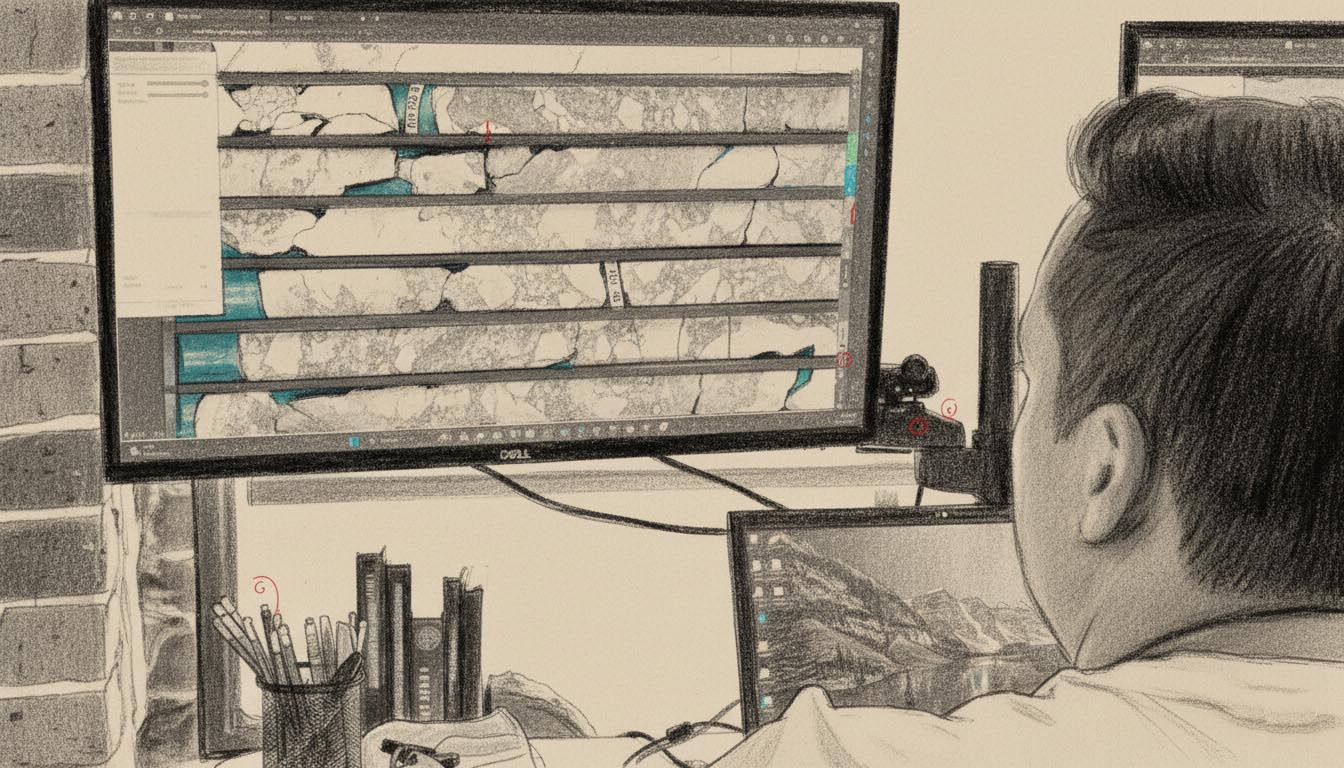Science
GeologicAI Innovates Mining with AI-Driven Core Logging

Mining companies are increasingly turning to artificial intelligence to enhance exploration efficiency, exemplified by the innovations of GeologicAI. The firm has developed a system that leverages advanced technology to analyze core samples, fundamentally changing how mineral potential is evaluated. This shift from traditional manual logging to a digital, data-driven approach aims to increase the accuracy and speed of mineral assessments, which are crucial for investment decisions.
Traditionally, the process of logging core samples involves experienced geologists manually documenting observations. Each narrow tube of rock, known as a core, is drilled at significant costs, ranging from $50 to $150 per meter. For a 1,000-meter hole, expenses can exceed $100,000. Many projects rely on the subjective interpretations of individual geologists, which can lead to missed opportunities for discovery. As Michelle Legat, vice-president of applied geosciences at GeologicAI, notes, “We miss things, and we miss a lot of things.”
GeologicAI’s innovation comes in the form of mobile labs that can scan core samples in real time. This technology replaces handwritten logs with high-resolution images and artificial intelligence that highlights key geological features, allowing for instant analysis and sharing. Legat explains that what was once a slow, manual process can now be completed in less than a day, with results that are more consistent and reliable.
The company recently raised $44 million in Series B funding from investors including Breakthrough Energy Ventures, BHP Ventures, and Rio Tinto, aiming to scale these advanced systems globally. The funding reflects a growing recognition of the critical role that technology plays in modern mining practices.
Transforming the Mining Landscape
The global mining industry is undergoing a transformation driven by technological advancements. According to the Mining Association of Canada, the mining sector contributed $117 billion to the Canadian economy in 2023, accounting for 4% of the national GDP, and providing jobs for 430,000 individuals directly, with an additional 281,000 in indirect roles.
As demand for critical minerals, necessary for electric vehicles and renewable energy technologies, continues to rise, mining companies are under increasing pressure to adopt innovative solutions. Countries like Australia, Chile, and China are investing in digital exploration technologies to improve their mineral output. This global trend underscores the importance of data and technology in reshaping the future of mining and how resources are managed within international supply chains.
Data-Driven Decisions in Mining
Under the leadership of John Mortimer, who recently joined GeologicAI as chief technology officer, the company is focusing on integrating advanced data solutions into mining operations. Mortimer emphasizes the importance of robust data collection, stating, “If there is one thing that we need to care about, it’s the data. It’s the data platform.” His team is tasked with ensuring that the digital records generated by GeologicAI can be trusted and utilized effectively by major mining corporations.
The implications of these technological advancements are already being felt in the field. At a silver mine on Canada’s west coast, GeologicAI’s scans identified high-grade material that had previously gone unnoticed. “They had a high-grade sample at the top and they did not sample it whatsoever,” Legat explains. “Now we can expand into parts of the mine we did not know we should be looking at.” Such discoveries can significantly impact the economics of mining projects and investor confidence.
Despite the clear benefits of this technology, some veteran geologists have been skeptical of replacing traditional methods with digital solutions. Legat recounts her experiences with seasoned loggers who initially resisted the new technology. However, once they recognized the enhanced detail and accuracy that the scans provided, their attitudes shifted dramatically. “Once you win those ones, you win everybody,” she says.
The adoption of GeologicAI’s technology illustrates a larger cultural shift within the mining industry. The need for consistent data across different projects and teams has led to the establishment of standardized practices in core logging. The company’s Auto Lithology Logger, for instance, assists geologists in quickly learning how to classify rocks based on past classifications at specific sites.
As mining companies increasingly rely on digital records, the potential for improved efficiency and reduced risk becomes evident. The tools provided by GeologicAI not only expedite the analysis process but also create permanent records that can be reviewed and validated over time.
In an industry characterized by uncertainty, the ability to make informed decisions based on reliable data is invaluable. GeologicAI’s advancements represent a significant step toward transforming how mining exploration is conducted, from the core shack to corporate offices. If successfully scaled, these innovations could redefine standards across the mining sector, ultimately paving the way for more efficient and lucrative exploration practices.
-

 Science3 months ago
Science3 months agoToyoake City Proposes Daily Two-Hour Smartphone Use Limit
-

 Top Stories3 months ago
Top Stories3 months agoPedestrian Fatally Injured in Esquimalt Collision on August 14
-

 Health3 months ago
Health3 months agoB.C. Review Reveals Urgent Need for Rare-Disease Drug Reforms
-

 Technology3 months ago
Technology3 months agoDark Adventure Game “Bye Sweet Carole” Set for October Release
-

 World3 months ago
World3 months agoJimmy Lai’s Defense Challenges Charges Under National Security Law
-

 Lifestyle3 months ago
Lifestyle3 months agoVictoria’s Pop-Up Shop Shines Light on B.C.’s Wolf Cull
-

 Technology3 months ago
Technology3 months agoKonami Revives Iconic Metal Gear Solid Delta Ahead of Release
-

 Technology3 months ago
Technology3 months agoApple Expands Self-Service Repair Program to Canada
-

 Technology3 months ago
Technology3 months agoSnapmaker U1 Color 3D Printer Redefines Speed and Sustainability
-

 Technology3 months ago
Technology3 months agoAION Folding Knife: Redefining EDC Design with Premium Materials
-

 Business3 months ago
Business3 months agoGordon Murray Automotive Unveils S1 LM and Le Mans GTR at Monterey
-

 Technology3 months ago
Technology3 months agoSolve Today’s Wordle Challenge: Hints and Answer for August 19









